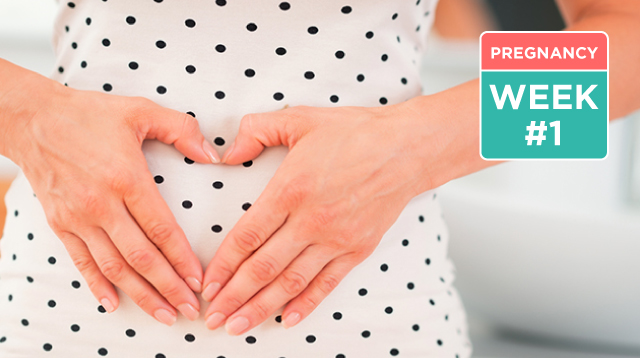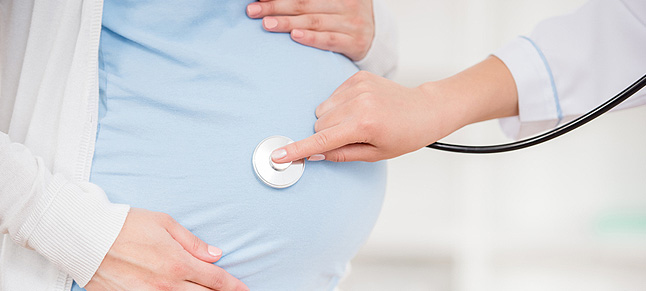
Welcome to the beginning of your pregnancy. Your doctor will count your period from the first day of your last period (LMP). So your 40 week pregnancy count actually starts now, about two weeks before your baby is conceived.
At 1 week you are not technically pregnant yet, but this is an important time to prepare. As your body begins a new pregnancy cycle, you and your partner can prepare to be open about your feelings and expectations, choose a healthy lifestyle, and choose a doctor if you don’t already have one.

If you’ve taken a pregnancy test and noticed a startling pink streak, you may be further away than you think. Most home pregnancy tests detect pregnancy about two weeks after conception, so you may want to move on to week 4.
Your General Symptoms This Week
You still can’t pinpoint the symptoms you experienced in the first week of pregnancy. This week’s discomfort brings you your period.
This way you can feel like you normally would during your period. Some women don’t experience much menstrual cramps at all, but for others, variable hormones can cause typical problems such as:
- Swelling of the stomach
- Cramps
- Fatigue
- Breast sensitivity
- Headache
- Miss eating
- Mood
Self Service Tips
Now is the time to create the most hospitable and healthy environment for your future baby. If you’re eating well and living an active lifestyle, that’s great.
If your lifestyle could use a little health boost, it’s never too late to start. Small changes can make a big difference in your overall health and the health of your future pregnancies.
Evaluate Your Diet
Eating a healthy, balanced diet full of nutritious foods will provide your body with the vitamins, minerals and nutrients you need while you wait. Good nutrition gives you energy and helps you manage some of the most common ailments during pregnancy. Eating a nutritious diet will also improve the health of your pregnancy and will have a long term effect on the health of your unborn baby

Consumption of Folate (Vitamin B9)
Folate is the natural form of vitamin B9 found in foods. This is important for your health and the health and development of your growing baby during pregnancy. However, it is not always easy to get all the folate you need from food every day.
Folic acid is a synthetic folate supplement found in many prenatal vitamin products, but you can also find supplements with an active form of folate (often called L-methylfolate or 5-MTHF). Health organizations such as the CDC, American College of Obstetricians and Gynecologists, and others recommend that women of childbearing potential who are not at high risk of having a child with a neural tube defect (NTD) take 400 micrograms (mcg) of folic acid daily.
Taking folic acid supplements can prevent birth defects such as cleft lip and palate as well as neural tube defects such as spina bifida. pregnancy vitamins.
Also Read : Period Pain,Diet Tips To Ease Menstrual Pain
Make Healthy Lifestyle Choices
It doesn’t all depend on what you add to your routine; it’s also about what you take. When trying to conceive, it is more important than ever to avoid alcohol, drugs and tobacco, including e-cigarettes.
This habit can affect the baby and cause genetic disorders, breathing problems, low birth weight, fetal alcohol syndrome, and other health problems.
Prepare Yourself Mentally
Preparing to hold a baby involves preparing your body and mind. Hormonal changes, stress, and anxiety can affect your mental health and pregnancy.9 However, during pregnancy and after delivery, thinking about your needs and taking care of your mental health before conception can help.
Make sure you get enough rest by identifying your social support system, managing stress and anxiety, and talking to your psychiatrist if you have other mental health problems.
Your 1 Week Checklist
- Add some nutritious foods to your diet.
- Start by taking vitamin B9 or a multivitamin or prenatal vitamin that contains folic acid or L-methylfolate.
- Choose a healthy lifestyle without drinking or using drugs, and if you smoke, try to quit.
- Prepare yourself physically and mentally for pregnancy.
Tips For Partners
Pregnancy occurs between couples and it means that both parties need to take care of their health and well-being. Before trying to conceive, couples can be screened for possible sexually transmitted infections (STIs) and treated.
Couples can also improve their reproductive health by reducing alcohol consumption and quitting smoking and drugs. Studies show that men who drink, smoke, or use drugs to excess can have problems with their sperm, making pregnancy difficult.
It’s also important to talk about how you went about your pregnancy and what your hopes are. Starting your pregnancy with healthy conversations can help you maintain good communication skills and strong relationships as you make this journey and make the successful transition to co-parenting.
At Your Doctor’s Office
If you don’t have a doctor or midwife yet, put this at the top of your to-do list. And if you have a doctor but don’t have a pre-conception appointment, now is the time to get one.

During your pre-pregnancy visit, your doctor or midwife can recommend prenatal vitamins, review your medical and vaccination history, screen you for sexually transmitted infections, and perform a physical exam.
It is also an opportunity to determine which lifestyle, diet, exercise, and other personal habits may affect your pregnancy while keeping it under control.
You should also ask your doctor about the safety of any medications, over-the-counter medications, or herbal supplements you are taking.13 If you follow the recommendations of your doctor and all of your healthcare providers, you will find that you are doing your best to achieve a pregnancy. best healthy.
Upcoming Visit To The Doctor
You can call your doctor as soon as you get a positive home pregnancy test, as some doctors will order a blood test to confirm pregnancy. However, you will most likely have your first prenatal visit to the doctor at week 8.
Recommended Product
Week 1 is a great time to start taking prenatal vitamins, if you haven’t already.
Prenatal Vitamins
Prenatal vitamins cannot replace proper nutrition, but they can fill imperfect nutritional gaps. They’re also a great way to make sure you’re getting all the nutrients you need, even if you have healthy eating habits.
Prenatal vitamins usually contain iron, calcium, vitamin D, and other important nutrients such as folic acid. However, each brand may contain different vitamins and minerals, so read the label carefully or ask your doctor for a recommendation or prescription.
Your Baby’s Development After 1 Week
Even if you don’t have a baby yet, your body is preparing for pregnancy. During menstruation, the lining of the uterus separates along with the unfertilized egg from the last cycle.

After three to seven days of menstruation, your ovaries begin to prepare for the egg, which is released during ovulation, and the lining of the uterus begins to thicken to accommodate the egg after fertilization.3 If all goes well, you will be a week pregnant 3.
Watch video to get real answers to the biggest questions about pregnancy.



